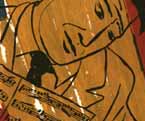
|
|
 [
AJHF |
About |
Home |
News |
Dates |
Artists |
Archive
]
[
AJHF |
About |
Home |
News |
Dates |
Artists |
Archive
]
[ Facebook | Hall of Fame | Downloads | Board | Links | Donations | Memberships ]
Archive
Article
November 1991 - Nightflying Column (Ampside Chat) - Russianby Lee Tomboulian
Hey, we've forgotten how to journalize here at Nightflying. All we can do is philosophize, We're going back to reporting, We don't care how they criticize.
Yeah, baby.
This time we're going to intertwine two settings: Drummer and pianist Art Lande and his Russian Dragon Band at the Oyster Bar, October 21st; and a gig I did shortly before Halloween in Greeneville, Mississippi, with the lovely and talented Danny and Cathy Fletcher, AKA Little Rock Stuff.
(Two different versions of our Ampside Chat SubFeature: Life in the Trenches.)
***
The name Russian Dragon does not refer to anyone's nationality in the band, according to Art. It refers to the fact that "anyone in this band can go at whatever speed they want to"---rushin', draggin'. Deliberately.
'I mean, we'd all be fired from another band for doing that, but we do it all the time," he said to Jack Hill in the Arkansas Democrat-Gazette.
At the band's clinic at UALR, Art explained more fully. "Say we're playing 'I Got Rhythm' and Khabu (the guitarist) is soloing. He may decide to shift to a faster tempo. When he does that, the bass player, sax player and I may all elect to go with him. Or not. Or go slower." In practice, at least that afternoon, the bass player (Dwight Killian) would stay at the original tempo, and Art, on drums, would slip down to a slower speed for a period and then rejoin the bass player. Sometimes he would join Khabu for a while.
"Naturally, the players need self-reliance and fortitude to stay with their chosen tempo and not go with the new one." The effect of these tempo changes on the music was often exhilerating, and occasionally confusing, like watching friends move around at a good party. Once in a while I wished they settled on a groove more often, but when they would, it was liberating.
A question for Khabu as soloist: Don't you normally, in jazz, solo over a given set of chord changes? How do you know when to change chords if you're now at a tempo other than the bass player's?
Khabu: Well, now that I'm at a new tempo, I can either shoot for changing roughly when the bass player does, or impose my own harmonic structure on the top. (!)
Then the band demonstrated "disappearing" for us. That is, the soloist solos (in this case, Bruce Williamson on alto) and the rest of the band, which is accompanying, starts fading away to nothing, leaving the soloist to solo by himself. Then the band fades back in, and Bruce fades to almost nothing while continuing to solo. Then he fades in again. "It's as if Bruce took a walk out into the hall with his sax for a while and came back," Art said, and so it was.
Then there's sheer variety. "So often bands just have everybody playing all the time...In our band, anybody can duo with anyone else. Within our band, there are six different duos, four different trios...While a duo is improvising freely, that is, without chord changes, the other two of us can accompany." Bruce and Dwight started duoing, and Khabu and Art played behind them. "Now I can set up accompaniment figures to play, using hand signals." He then flashed five fingers twice, then three. "This tells the other accompanist how many notes the phrase we play will be." Art flashed the 5-5-3 figure to Khabu, and then played the figure, a plaintive, hesitant li'l phrase. The second time through the phrase Khabu sort of had it down, and the third time they had it together (it was Khabu's choice as to which pitches to use).
Instant composition without pen and paper, not unlike what Zappa used to do. If your players are attentive, and willing, and able it seems to work great.
[Articles | Obituaries | Press Releases | Research | Schedules | NAJS]
Arkansas Jazz Heritage Foundation · PO Box 251187 · Little Rock, AR 72225-1187 US · info@arjazz.org
Copyright © Arkansas Jazz Heritage Foundation. All rights reserved.
Information on AJHF and Jazz:
Comments on web site:
About this site. We appreciate those who have helped create this site.
URL: https://www.arjazz.org